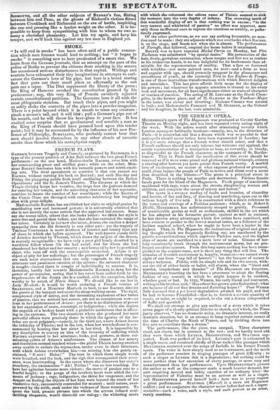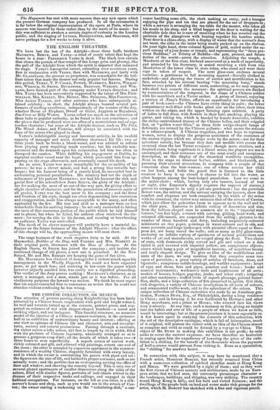THE GERMAN OPERA.
MEYERBEER'S opera of The Huguenots was produced at Covent Garden Theatre on Monday night, and has been repeated every acting night of the week. With the active search after stimulating novelty which London managers habitually institute—usually, too, in the direction of Paris—it is somewhat odd that a drama which was so popular in that metropolis should never before have been represented in London ; but it is yet more strange that a French writer should select, and that a French audience should not only tolerate but welcome and applaud, the scenic representation of a transaction so base, so cowardly, so bloody, so disgraceful to the French character, as the massacre of St. Bartho- lomew. That in Paris itself the recollection of this event should be renewed as if it were some proud and glorious national triumph, evinces a craving after horrors yet more potent than French vanity. A morbid love of excitement, no matter at what expense produced or procured, could alone induce the people of Paris to revive and shout over a scene thus described in the libretto—" The scene is a principal street in Paris. There is nothing but murder and destruction. Furious fanatic bands pant for the blood of the Huguenots. Fresh gangs of murderers, maddened with rage, roam about the streets, slaughtering women and children, and complete the scene of misery and horror."
The opera is a strange medley of faults and beauties, of absurdity and horror, of fun and fury, of dancing and murdering, spun out to the tedious length of five acts. It is constructed with a direct reference to the tastes and cravings of a Parisian audience ; which, as in Robert le Diable, MEYERREER has unfortunately stooped to gratify. Possessed of considerable genius as well as enthusiasm, skilled in the art which be has adopted as his favourite pursuit, opulent as well as eminent, he has thrown away advantages which few artists have combined, and been content to pander to the lowest musical tastes, as a follower of the feeblest musical school, when he ought to have been a leader in the highest. Thus, in The Huguenots, the indications of original and glow- ing thought which are frequently flashing out, are smothered by the puerile conventionalisms which captivate Parisian ears, and the higher aims of music are sacrificed to a mere love of noise. Gleams of me- lody occasionally break through the instrumental storm, but no pro- longed sunshine appears. From this long opera nothing has been trans- planted to the concert-room, nor is there any thing that will live. The stimulus of feverish excitement is, happily, transient—we cannot every night of our lives "sup full of horrors " ; but the banquet of nature is always welcome. Fidelio, with its simple tale and its two scenes, with- out the aid of either battle or ballet, will charm, when the "blood and murder, blunderbuss and thunder" of The Huguenots are forgotten. MEYERDEER'S besetting sin has been a proneness to adopt the fleeting fashion of any country in which he might happen to be resident, whether good or bad. In 1822, WEBER, his early friend and instructer, writing to his brother, said," Meyerbeer has grown quite Italianized : what are become of all our fine dreams and flattering hopes ? " Poor WEBER little dreamed that a yet lower degradation awaited his pupil, and that he had to become Frenchified—that is, to furnish a certain quantity of music, or noise, as might be required, to eke out a drama compounded of ballet and spectacle !
We shall not attempt to give any outline of a story which it takes seven pages of a closely-printed libretto to sketch, and which, the Times justly observes, " has no dramatic unity, no dramatic interest, no really dramatic situation, but is an attempt to heap together certain scenes of the time of Charles the Ninth of France, and by dividing them into five acts to constitute them a drama."
The performance, like the piece, was unequal. Three characters stood, not above, but in contrast to the rest ; and we hardly need add they were those which LUTZER, HEINEFETTER, and STAUDIGL sup- ported. Each was perfect of its kind. LUTZER 'S part is exhausted in a single scene, and consisted chiefly of those rocket-like passages which MEYERBEER scattered over the songs of Isabella in his former French opera. The voice is here simply used as an instrument, and the merit of the performer consists in singing passages of great difficulty : to such a singer as LUTZER this is a degradation ; but nothing could be more perfect than her execution of every passage, or more easy and unembarrassed than her performance. Upon HEINEFETTER'S powers the author as well as the composer made a much heavier demand, her part requiring mental and bodily exertion of no ordinary kind : the representative of Valentine must be an actress as well as a singer, and HELNEFETTER proved herself both ; hers was in every respect a great performance. STAUDIGL (Marcel) is a stern old Huguenot soldier ; and we conjecture the character never before had such a repre- sentative—such a voice, such a style, and such powers as an actor, rarely combine. The Huguenots has met with more success than any new opera which the present German company has produced. In all the accessories it is far below the original representation of the opera at Paris, where its success was insured by these rather than by the merit of its music: but this was sufficient to awaken a certain degree of curiosity in the London public, and the singing Of LUTZER, HEINEFETTER, and STAUDIGL, Will serve perhaps for a few weeks to keep it alive.



























 Previous page
Previous page